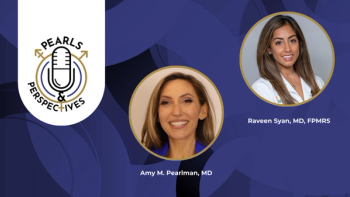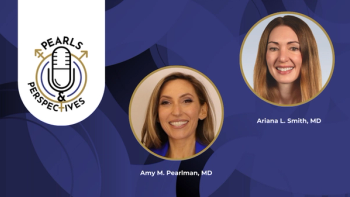
Selection Preferences in Second-Line Therapy Classes for OAB
Experts explore the clinical benefits and limitations of standard pharmacological options, like anti-muscarinic agents and beta-3 adrenergic agonists, and share their preferences and experiences in selecting and managing treatments for OAB, focusing on the effectiveness and patient-specific considerations in their clinical practice. In this episode, Dr. Kennelly, alongside Drs. Eilber and Benson, discusses the transition to second-line therapies for overactive bladder, focusing on medication classes like anticholinergics and beta-3 agonists. They explore patient-centered considerations such as medication compliance, cost, insurance coverage, and the chronic nature of overactive bladder management, emphasizing individualized treatment based on patient needs and health profiles.
Episodes in this series

Dr Kennelly: What's the decision point to kind of think about second line therapies? So I think Dr. Eilber, you're talking about first line therapies. Can you talk about what are second line therapies?
Dr. Eilber: So the second line therapies are typically medication. We have our two classes, the anticholinergic that have been around for decades and then the newer beta -3 agonists, but the decision decision to move on to second -line therapy is really, again, back to what we initially discussed, how bothered the patient is. People may be bothered enough that they will seek the most conservative treatment, which is behavior modification. But when it comes to taking medication, a lot of people just don't want to, and they'd rather just put up with their symptoms.
Dr Kennelly: And Dr. Benson, do you actually recommend one class to the other? In your practice, have you? used both and what have you seen?
Dr. Benson: Sure, so we absolutely use everything under the sun as far as medications are concerned. And, you know, there's so many considerations that go into that, Dr. Kennelly. One is just the class of the drug related to the patient and their overall health. I think cost is an issue, insurance coverage is an issue, compliance is an issue. And frankly, I think no matter what you choose, for a medication, what the studies would support is that we do, patients in particular do not like to stay on meds. And there's any number of reasons for that, but I think we've all had those struggles in our practice. So when I begin to talk to a patient about medication use, I really frame OAB as a chronic medical condition. And I think that's important for them to understand that. There's probably not like a definitive intervention like there might be for stress incontinence that quote resolves it. So I always mentioned to patients, stress incontinence is like breaking your arm, getting a cast and resolving it. Having OAB is like having diabetes and monitoring your blood sugars and being good to yourself and using meds. And so they have to go into that with that idea that they're not gonna use it for a month and be done with it. They're probably gonna have an ongoing relationship with us. So that's really where our conversation starts and be done with it for a month we are going to go down this road and you see improvement there's going to be compliance issues and you're going to have to you know continue that or look at other things. So when you ask about the classes of medications I think many of us are really to a degree hamstrung by insurance considerations in what we can do because the best option in the world is not an option if you can't afford it or have coverage for it. So we do work with both anti-muscarinics and beta -3 agonist care. I personally, you know, have feelings about one as maybe being preferable to the other for some of the emerging data and side effect issues. But I would say we work with all of them at this point, just based on an individual basis.
Dr Kennelly: And Dr. Eilber, how effective are these agents? And are they effective for, let's say, frequency -only or urgent incontinence or in your life? on that?
Dr Eilber: That's a good question. And for me personally, when someone really just has frequency and urgency and never leaks, and we'll talk about this in another segment, I think that neuromodulation often works better 'cause it seems like a sensory issue. People who leak, they're clearly having bladder spasm. And if it's too strong for the... medications, which in essence are bladder muscle relaxants, that's when we also move on to third line therapy, such as on a botulinum toxin for the bladder.
Dr Kennelly: So you're kind of saying there may be a difference between overactive bladder dry, which is urgency frequency versus overactive bladder wet, which the bladder will contract and have urgent condense.
Dr Eilber: I do. I think it's probably a little more separate out in women again, because women tend to have wet. For men, they may have still a very spastic bladder and not leak simply because their prostate is preventing them from having incontinence. –
Dr Kennelly: Right, so do you think that some of these medicines are better for men, or do they work as effectively in men versus women's in your experience? And then are ones preferred more than others based on the class?
Dr Eilber: Yeah, there's no data today that one works a lot better than the other. I think anecdotally, we all have some preference towards some. I think the deciding factors of how you choose your medication are just as Dr. Benson had elaborated, what is covered, what are the side effects, what are the contraindications with the patient's medical conditions and other medications. So the medications, I think, do work for a fair number of people, but they certainly don't work for everybody, which is why we have their line therapies.
Dr Kennelly: Yeah, so it seems as if head and shoulders, there's no one sort of medicine that's, you know, high above the others and the classes seem to be the same.
*Video transcript is AI-generated and reviewed by Urology Times® editorial staff.
Newsletter
Stay current with the latest urology news and practice-changing insights — sign up now for the essential updates every urologist needs.






